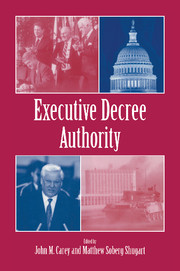Book contents
- Frontmatter
- Contents
- List of Contributors
- Preface
- 1 Calling Out the Tanks or Filling Out the Forms?
- Part I From Delegated to Constitutional Decree Authority
- Part II Constitutional Decree Authority and Conflict Between the Branches
- Part III Absence of Conflict Over Decree
- Appendix of Constitutional Provisions Regarding Decree
- References
- Index
Appendix of Constitutional Provisions Regarding Decree
Published online by Cambridge University Press: 18 December 2009
- Frontmatter
- Contents
- List of Contributors
- Preface
- 1 Calling Out the Tanks or Filling Out the Forms?
- Part I From Delegated to Constitutional Decree Authority
- Part II Constitutional Decree Authority and Conflict Between the Branches
- Part III Absence of Conflict Over Decree
- Appendix of Constitutional Provisions Regarding Decree
- References
- Index
Summary
ARGENTINA
CDA
Article 99.3: The Executive Power shall never issue lawmaking decisions. These kinds of measures will be considered null and void.
Only when exceptional circumstances make it impossible to follow the ordinary lawmaking process established by this Constitution, the Executive can issue NUDs insofar as they do not regulate penal, fiscal, electoral or political party matters. NUDs must be decided by the Cabinet assembled and must be countersigned by the Cabinet Chief and the other Ministers.
Within ten days the Cabinet Chief will personally submit the NUD to a Permanent Bicameral Committee which will be composed proportionally according to the political representation of the House and the Senate. The Committee will send its opinion to the floor within ten days. The House and the Senate must immediately consider the opinion. A special act, passed by the positive vote of the majority of the members of the House and the Senate, will determine the proceedings and effects of the Congress intervention in this matter.
DDA
Article 76: Legislative delegation to the Executive is forbidden except in the case of matters of administration and public emergency, with a limited time period for its effectiveness and within the standards for the delegation of authority established by Congress.
The expiration of the time period mentioned above will not cause the revision of the legal relations born under the rules issued as a consequence of the legislative delegation.
- Type
- Chapter
- Information
- Executive Decree Authority , pp. 299 - 312Publisher: Cambridge University PressPrint publication year: 1998



